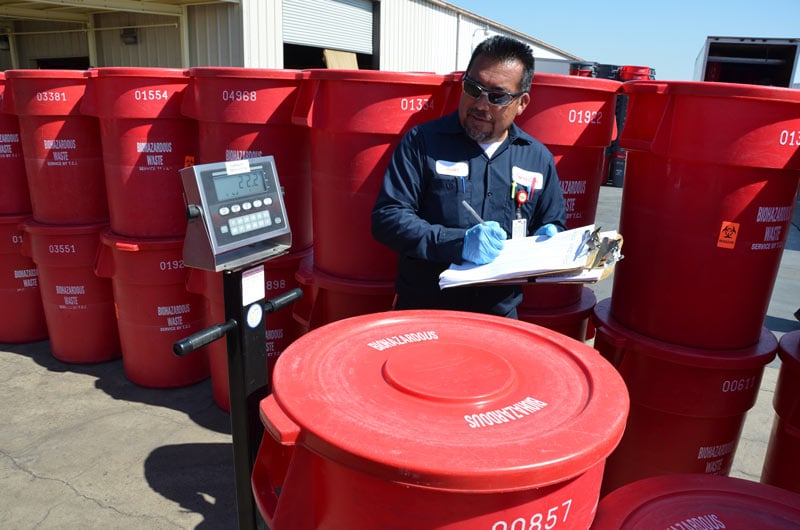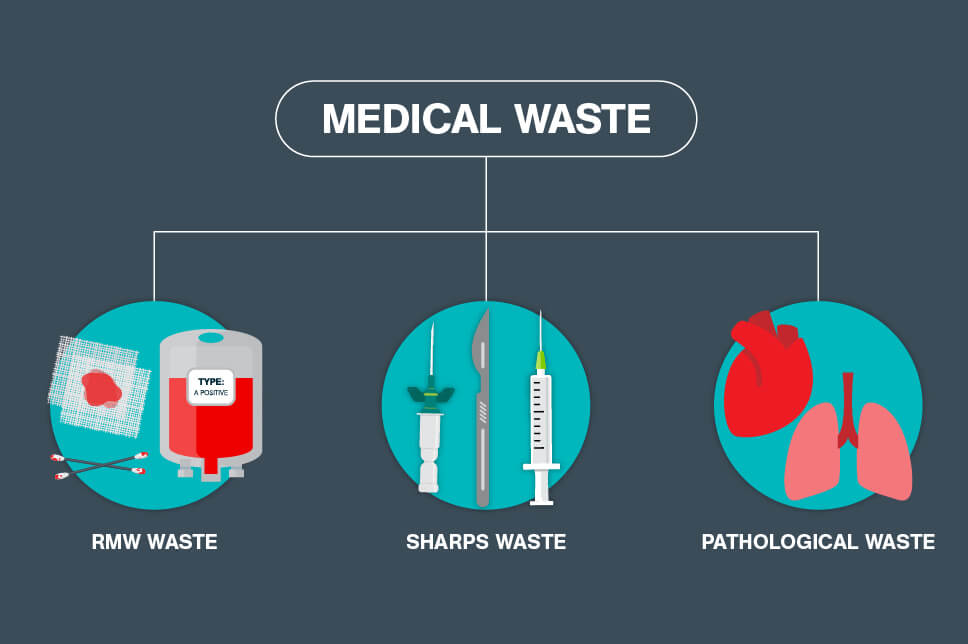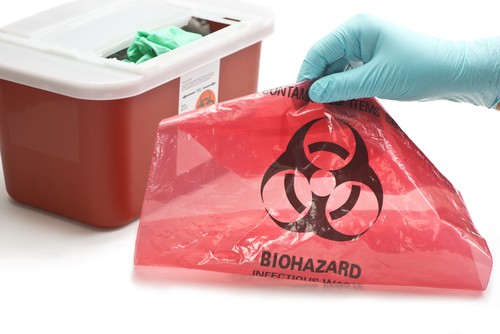Safe and Reliable Medical Waste Removal: Your Trusted Environmental Partner
Wiki Article
Ensuring Safe Handling and Disposal of Medical Waste
Guaranteeing safe handling and disposal of medical waste is of paramount value in health care setups. Incorrect monitoring of clinical waste can pose considerable risks to the environment, public health, and health care employees. This demands adherence to rigorous guidelines and methods for its risk-free handling and disposal. In this introduction, we will certainly explore the relevance of proper clinical waste management, the dangers related to incorrect handling and disposal, along with the guidelines and techniques that can be carried out to ensure its risk-free disposal. Furthermore, we will certainly review the importance of training and education and learning for medical care experts in order to maintain a tidy and risk-free medical care environment. By following these methods, we can effectively reduce the potential threats related to medical waste.Relevance of Correct Clinical Waste Administration
Correct clinical waste administration is of utmost significance in making sure the security and wellness of healthcare experts, clients, and the general public. Medical waste refers to any type of waste created by healthcare facilities throughout the medical diagnosis, therapy, or immunization of humans or animals. This waste can posture significant health and wellness threats if not managed and thrown away properly.
One of the primary factors why appropriate medical waste management is important is to avoid the spread of contagious illness. Clinical waste, such as utilized needles, infected dressings, and biological products, can lug unsafe pathogens. Otherwise handled and disposed of properly, these virus can be transmitted to health care employees, patients, waste handlers, and also the general public, causing the possible outbreak of illness.
Additionally, appropriate clinical waste administration aids secure the environment - medical waste disposal service. Medical waste consists of unsafe materials, including chemicals, drugs, and contaminated compounds. When not taken care of properly, these materials can pollute dirt, water bodies, and the air, presenting a substantial danger to communities and public health
Furthermore, efficient medical waste monitoring makes certain conformity with international criteria and regional regulations. Governments and governing bodies have actually established methods and guidelines to make sure the secure handling, storage, transport, and disposal of medical waste. Following these regulations is vital to prevent lawful repercussions and keep the reputation and reputation of healthcare facilities.
Threats of Improper Handling and Disposal

If clinical waste is not appropriately disposed of,People can also be revealed to these transmittable conditions. If polluted needles or other sharps are not disposed of in designated puncture-proof containers, they may unintentionally prick clients, leading to possible infections. If medical waste is not segregated properly, there is a risk of cross-contamination between different kinds of waste, further boosting the opportunities of disease transmission.
Incorrect disposal of medical waste can additionally have harmful impacts on the environment and the public. If clinical waste is not dealt with and disposed of correctly, it can infect water resources, dirt, and air, bring about the spread of conditions and contaminants. This can have long-lasting consequences on environments and public wellness.
Guidelines for Safe Handling of Medical Waste
Implementing reliable procedures for the safe handling of clinical waste is crucial in making certain the security of healthcare professionals, patients, and the basic public. These standards are vital in decreasing the threats connected with the handling and disposal of medical waste, such as infections, injuries, and environmental pollution.First and foremost, healthcare facilities should develop a thorough waste monitoring plan that complies with regional, national, and worldwide guidelines. This strategy must include clear directions on waste segregation, product packaging, storage, labeling, and transportation. It is essential to separate various sorts of waste, such as sharps, contagious products, pharmaceuticals, and non-hazardous waste, to avoid cross-contamination and promote risk-free disposal.
In addition, healthcare workers have to get thorough training on appropriate waste handling strategies. They should be informed on the possible risks of clinical waste, the suitable use individual protective tools (PPE), and the appropriate treatments for dealing with, transferring, and getting rid of different kinds of waste.
Additionally, medical care facilities should regularly monitor and investigate their waste management practices to guarantee compliance with guidelines. This consists of performing normal assessments, evaluating waste handling procedures, and offering comments and training to personnel.
Reliable Techniques for Waste Disposal
To make sure the safe handling and disposal of medical waste, it is vital to use effective approaches for waste disposal. Medical waste can posture substantial threats to public wellness and the atmosphere otherwise handled and disposed of properly. Health care facilities and waste management companies need to execute suitable strategies to mitigate these threats.One efficient technique for waste disposal is partition. It includes separating different kinds of clinical waste based upon their features. Partition enables for the appropriate treatment and disposal of each waste classification, decreasing the capacity for contamination or damage. Health care centers must give clear standards and training to team participants on how to segregate waste appropriately.

Furthermore, healthcare centers should team up with qualified waste management companies to guarantee appropriate disposal of clinical waste. These firms have the know-how and tools called for to safely dispose and manage of clinical waste in conformity with laws and ideal techniques.
Training and Education for Healthcare Professionals
Healthcare professionals play an important duty in ensuring the safe handling and disposal of medical waste through extensive training and education. It is crucial for doctor to have a deep understanding of the prospective threats associated with medical waste and the correct protocols for its administration. By obtaining proper training, medical care experts can decrease the potential transmission of infectious diseases, protect against environmental contamination, and shield both themselves and the general public.
Moreover, training programs ought to stress the use of individual protective equipment (PPE) and correct hand health methods when dealing with clinical waste. medical waste disposal service. Medical care experts need to understand just how to correctly dispose and use of PPE to secure themselves from possible exposure to unsafe materials. They must also be informed on the importance of normal handwashing and the proper usage of hand sanitizers to reduce the spread of transmittable illness
Continuing education and learning and regular updates on clinical waste management methods are important for healthcare experts. As standards and policies advance, it is important to maintain health care companies educated about any type of adjustments in procedures and ideal practices. This will make certain that they stay updated and keep a high standard of safety and security in handling and getting rid of of clinical waste.
Verdict
In verdict, appropriate handling and disposal of medical waste is vital to guarantee the security of medical care professionals, people, and the setting. By sticking to these methods, we can reduce the potential threats connected with medical waste.Clinical waste refers to any kind of waste produced by healthcare centers during the diagnosis, therapy, or booster shot of pets or human beings. If clinical waste is not set apart effectively, there is a risk of cross-contamination between various kinds of waste, more increasing the possibilities of condition transmission.
It is essential to separate different types of waste, such as sharps, transmittable materials, drugs, and non-hazardous waste, to prevent cross-contamination and promote secure disposal. WasteX Medical Waste Disposal.
To make certain the secure handling and disposal of clinical waste, it is essential to use reliable techniques for waste disposal. Additionally, health care centers must develop a routine waste collection and transport timetable to stop waste buildup and decrease the danger of accidents or contamination.
Report this wiki page